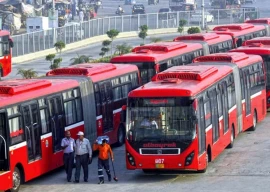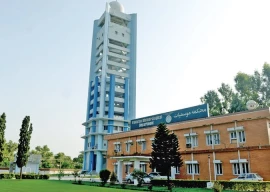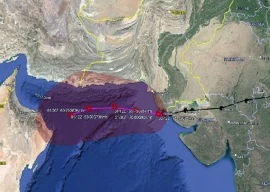
Here arises the million-dollar question: why don’t we follow traffic rules? While this could be the subject for extensive research, a logical answer could be that we as a nation do not believe in following rules in general, traffic rules being no exception.
But why don’t we believe in following rules? Perhaps because we (I mean many of us) have seen our leaders — and leaders also include our parents, elders and teachers — frequently breaking their self-professed principles and living a contradictory and yet contented life. And this might be an answer. But there can be other logical explanations for our road (mis) behaviour. The first of these alternative explanations can be encapsulated in the simple word, ‘ignorance’. I am sorry if I sound anticlimactic, but ignorance is also a cause of our chaotic behavior on road.
Just looks at the ‘mottos’ that we frequently come across, written on our public vehicles — trucks, buses, rickshaws and taxis. “Himmat hay tou paas kar, warna bardaasht kar” (overtake if you have got the guts, or show some patience), “Horn do, rasta lo” (honk and move on), “Overtake mera nakhra, speed meri jawani” (overtaking is my coquettishness, speeding is my youth). These bold verbalisations, apart from showing a defiant attitude, also reflect a blatant ignorance and lack of (traffic) sense.
However, there can be another deep-seated and seemingly far-fetched ‘cultural’ reason for our awkwardness — the fallouts of ‘diffusion of innovation’. Putting it simply, we can say that our chaotic road behaviour stems from the fact that we have borrowed both automobile and traffic rules ready-made from another civilisation. These inventions have made a place in our lives and are serving our needs but are still foreign to the inner patterns and demands of our collective psyche, making it difficult for us to adapt to the dynamics of their use.
Published in The Express Tribune, September 3rd, 2013.
COMMENTS (1)
Comments are moderated and generally will be posted if they are on-topic and not abusive.
For more information, please see our Comments FAQ

1723621875-0/kylie-(1)1723621875-0-165x106.webp)





1725083820-0/Untitled-design-(24)1725083820-0-270x192.webp)


1725192615-0/Untitled-design-(8)1725192615-0-270x192.webp)











When you stand in queue at a bank to pay bills, a stadium to watch a game or a movie theater to buy tickets, it is normal for people to push and shove. I have been at PIA immigration counters at the airport where seemingly educated people push and shove instead of waiting patiently for the line to move on its own. Pushing and shoving won't get you that ticket any sooner or your work done any faster as there are just as many people in front of you as there would have been without pushing and shoving. Moreover there is no regard for personal space, generally, in our culture. People get too close to you when they are interacting or as a matter of fact even when not interacting with you. I think a similar mindset rules our behavior when driving. People from Asia in general are known for their terrible driving in US. I think this disposition to break traffic rules and regulations is in our genes.